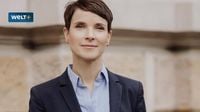Frauke Petry, the former leader of the Alternative for Germany (AfD), is making waves with her announcement of a political comeback, intending to establish a new party ahead of the 2026 Bundestag elections. Petry, who left the AfD in 2017 following an internal power struggle, aims to present a distinctly liberal program that she believes addresses a crucial gap in Germany's political landscape.
In a recent interview with the Welt, Petry stated, "No existing party is demanding a drastic reduction of the state quota to 25 percent within five years." This bold assertion highlights her belief that the current political offerings do not adequately respond to the needs of the electorate. Petry's new party is positioned as an alternative to the established political elite, focusing on what she describes as an "anti-etatist, libertarian offer" that prioritizes individual freedoms and economic entrepreneurship.
The former AfD leader's vision for the party includes dismantling the welfare state, combating what she terms "state authoritarianism," and reinforcing cultural ties to the West. She has been vocal about her criticisms of the bourgeois camp, accusing them of ignoring the ongoing culture war in Germany. According to Petry, the political discourse has become stagnant, lacking the necessary representation for those who advocate for a significant reduction in state intervention.
As she embarks on this new political venture, Petry has established the organizational foundation through an already formed association known as Team Freiheit. This group is intended to support her vision and mobilize like-minded individuals who share her views on governance and economic policy.
Petry's political journey has not been without its challenges. Her first attempt at creating a political entity, Die blaue Partei, was largely unsuccessful and ultimately dissolved in 2019. However, she remains undeterred, believing that the current political climate presents a unique opportunity for her new party to thrive. She aims to create a platform that resonates with entrepreneurs and self-employed individuals, promoting Germany as a "paradise for business owners" once again.
In her recent statements, Petry has emphasized the necessity of her party's formation, stating, "The political gap in Germany does not lie between the CDU and AfD but rather in the absence of a true libertarian alternative." This perspective underscores her commitment to offering a distinct choice for voters who feel disenfranchised by the mainstream parties.
Moreover, Petry's focus on cultural issues reflects a broader trend in European politics, where right-wing parties increasingly emphasize national identity and cultural heritage. By positioning her party against what she perceives as the encroachment of state authority and cultural dilution, Petry hopes to galvanize support from voters who prioritize these issues.
Despite her past controversies and the mixed reception of her previous political endeavors, Petry's determination to re-enter the political arena signals her belief in the potential for change within the German political system. As she prepares for the upcoming elections, her new party will likely focus on attracting voters who are disillusioned with the status quo and seek a more radical shift in policy.
As the political landscape continues to evolve, Petry's efforts may resonate with a segment of the electorate that is eager for a different approach to governance. Her vision of a less intrusive state and a stronger emphasis on individual liberties could appeal to those who feel that their voices have been overlooked.
In conclusion, Frauke Petry's announcement to launch a new political party marks a significant moment in Germany's political discourse. With her focus on reducing state intervention and fostering a pro-business environment, she aims to carve out a niche for her party in a landscape dominated by traditional parties. As the 2026 elections approach, it will be interesting to see how her ideas are received by the public and whether she can successfully mobilize support for her vision of a more libertarian Germany.

